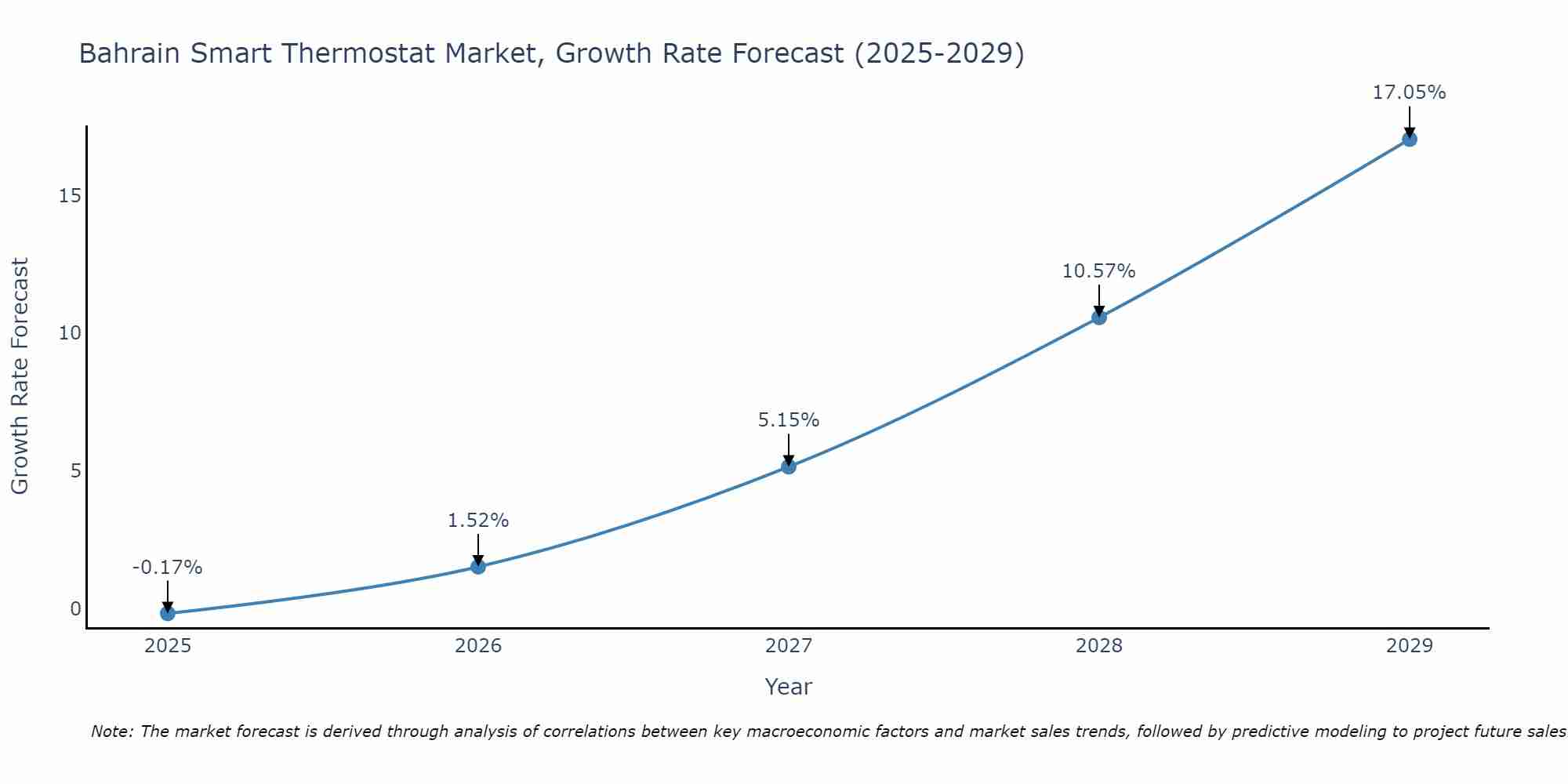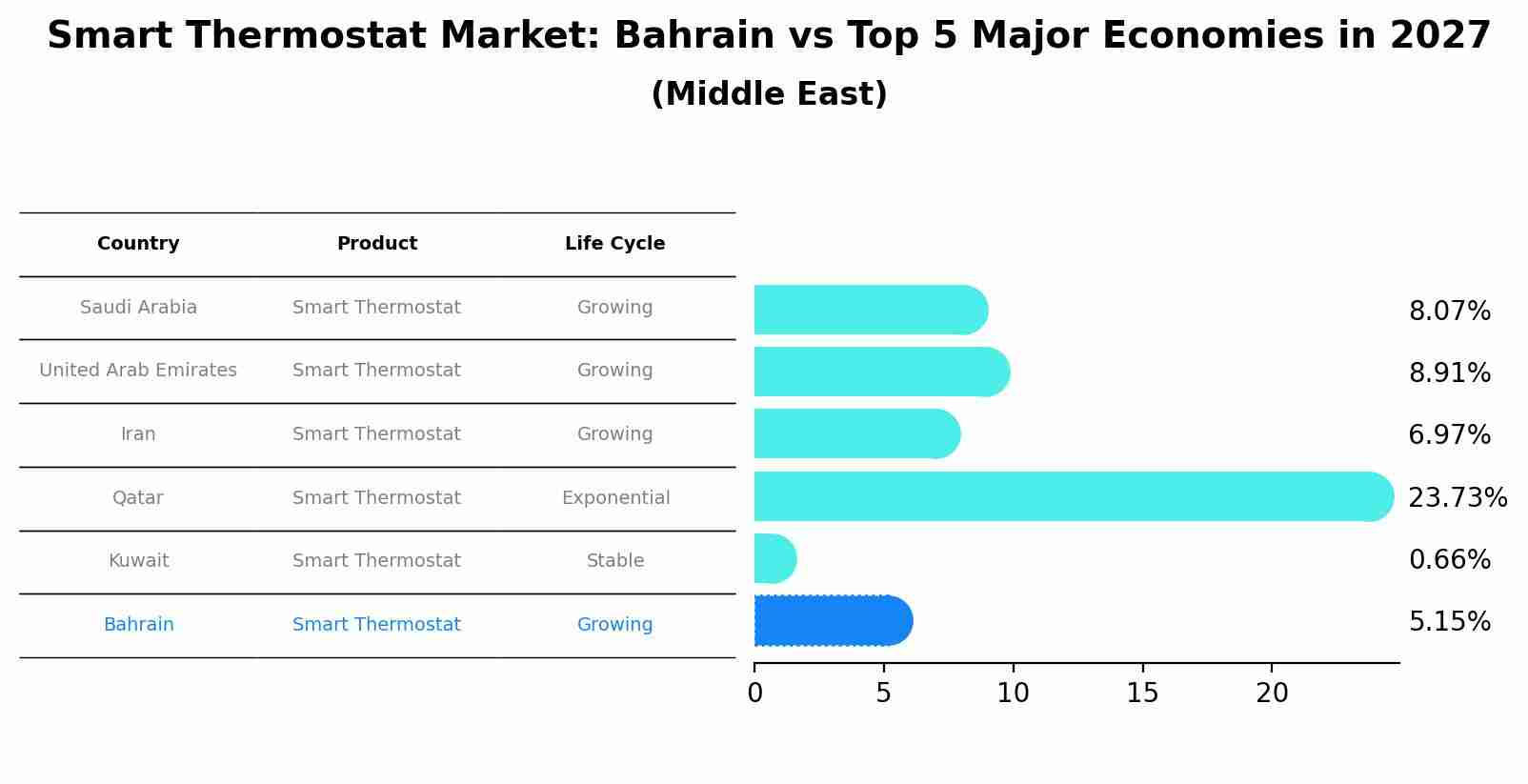Bahrain Smart Thermostat Market Outlook | Industry, Value, Forecast, Trends, Revenue, Analysis, Size, Companies, Share, COVID-19 IMPACT & Growth
| Product Code: ETC369524 | Publication Date: Aug 2022 | Updated Date: Apr 2025 | Product Type: Market Research Report | |
| Publisher: 6Wresearch | Author: Ravi Bhandari | No. of Pages: 75 | No. of Figures: 35 | No. of Tables: 20 |
Bahrain Smart Thermostat Market Size Growth Rate
The Bahrain Smart Thermostat Market is poised for steady growth rate improvements from 2025 to 2029. Commencing at -0.17% in 2025, growth builds up to 17.05% by 2029.

Smart Thermostat Market: Bahrain vs Top 5 Major Economies in 2027 (Middle East)
In the Middle East region, the Smart Thermostat market in Bahrain is projected to expand at a growing growth rate of 5.15% by 2027. The largest economy is Saudi Arabia, followed by United Arab Emirates, Iran, Qatar and Kuwait.

Bahrain Smart Thermostat Market Synopsis
Bahrain`s smart thermostat market is growing with rising demand for home automation and energy-efficient climate control. These devices enable remote temperature management and learning capabilities through AI and IoT integration. As energy conservation becomes a national priority, smart HVAC solutions are increasingly being adopted in residential and commercial settings.
Trends of the market
The smart thermostat market in Bahrain is benefiting from rising consumer interest in home automation and climate control. As energy prices and environmental awareness rise, both homeowners and commercial operators are adopting smart thermostats to optimize energy use. Features like mobile connectivity, AI-based learning, and integration with other smart home devices are driving demand, especially in new residential developments and high-end commercial properties.
Challenges of the market
The Bahrain Smart Thermostat Market is gradually expanding with the rise of smart home technologies and a growing focus on energy conservation. Smart thermostats allow users to control temperature settings remotely, improving efficiency and comfort. However, high costs and compatibility issues with older HVAC systems are significant barriers. Additionally, limited consumer awareness about long-term cost savings and a lack of skilled installers slow down adoption. Data privacy concerns also impact consumer confidence in connected devices.
Investment opportunities in the Market
As energy efficiency becomes a priority, smart thermostats for residential and commercial buildings present lucrative opportunities. Investors can supply and install smart thermostats in Bahrain, working with real estate developers, HVAC companies, and home automation specialists to provide energy-saving solutions with real-time temperature control.
Government Policy of the market
Smart thermostats are growing in relevance as Bahrain pushes forward with smart city and building automation initiatives. The Ministry of Electricity and Water and the Ministry of Housing support the integration of smart HVAC control systems into government housing and office infrastructure. Policy frameworks prioritize the adoption of energy-efficient technologies, encouraging property developers to implement smart thermostats that align with national energy conservation goals.
Key Highlights of the Report:
- Bahrain Smart Thermostat Market Outlook
- Market Size of Bahrain Smart Thermostat Market, 2021
- Forecast of Bahrain Smart Thermostat Market, 2031
- Historical Data and Forecast of Bahrain Smart Thermostat Revenues & Volume for the Period 2018 - 2031
- Bahrain Smart Thermostat Market Trend Evolution
- Bahrain Smart Thermostat Market Drivers and Challenges
- Bahrain Smart Thermostat Price Trends
- Bahrain Smart Thermostat Porter's Five Forces
- Bahrain Smart Thermostat Industry Life Cycle
- Historical Data and Forecast of Bahrain Smart Thermostat Market Revenues & Volume By Type for the Period 2018 - 2031
- Historical Data and Forecast of Bahrain Smart Thermostat Market Revenues & Volume By Wireless for the Period 2018 - 2031
- Historical Data and Forecast of Bahrain Smart Thermostat Market Revenues & Volume By Wireless for the Period 2018 - 2031
- Historical Data and Forecast of Bahrain Smart Thermostat Market Revenues & Volume By End-User Vertical for the Period 2018 - 2031
- Historical Data and Forecast of Bahrain Smart Thermostat Market Revenues & Volume By Residential for the Period 2018 - 2031
- Historical Data and Forecast of Bahrain Smart Thermostat Market Revenues & Volume By Commercial for the Period 2018 - 2031
- Bahrain Smart Thermostat Import Export Trade Statistics
- Market Opportunity Assessment By Type
- Market Opportunity Assessment By End-User Vertical
- Bahrain Smart Thermostat Top Companies Market Share
- Bahrain Smart Thermostat Competitive Benchmarking By Technical and Operational Parameters
- Bahrain Smart Thermostat Company Profiles
- Bahrain Smart Thermostat Key Strategic Recommendations
Frequently Asked Questions About the Market Study (FAQs):
- Single User License$ 1,995
- Department License$ 2,400
- Site License$ 3,120
- Global License$ 3,795
Search
Thought Leadership and Analyst Meet
Our Clients
Related Reports
- Canada Oil and Gas Market (2026-2032) | Share, Segmentation, Value, Industry, Trends, Forecast, Analysis, Size & Revenue, Growth, Competitive Landscape, Outlook, Companies
- Germany Breakfast Food Market (2026-2032) | Industry, Share, Growth, Size, Companies, Value, Analysis, Revenue, Trends, Forecast & Outlook
- Australia Briquette Market (2025-2031) | Growth, Size, Revenue, Forecast, Analysis, Trends, Value, Share, Industry & Companies
- Vietnam System Integrator Market (2025-2031) | Size, Companies, Analysis, Industry, Value, Forecast, Growth, Trends, Revenue & Share
- ASEAN and Thailand Brain Health Supplements Market (2025-2031) | Strategy, Consumer Insights, Analysis, Investment Trends, Opportunities, Growth, Size, Share, Industry, Revenue, Segments, Value, Segmentation, Supply, Forecast, Restraints, Outlook, Competition, Drivers, Trends, Demand, Pricing Analysis, Competitive, Strategic Insights, Companies, Challenges
- ASEAN Bearings Market (2025-2031) | Strategy, Consumer Insights, Analysis, Investment Trends, Opportunities, Growth, Size, Share, Industry, Revenue, Segments, Value, Segmentation, Supply, Forecast, Restraints, Outlook, Competition, Drivers, Trends, Demand, Pricing Analysis, Competitive, Strategic Insights, Companies, Challenges
- Europe Flooring Market (2025-2031) | Outlook, Share, Industry, Trends, Forecast, Companies, Revenue, Size, Analysis, Growth & Value
- Saudi Arabia Manlift Market (2025-2031) | Outlook, Size, Growth, Trends, Companies, Industry, Revenue, Value, Share, Forecast & Analysis
- Uganda Excavator, Crane, and Wheel Loaders Market (2025-2031) | Strategy, Consumer Insights, Analysis, Investment Trends, Opportunities, Growth, Size, Share, Industry, Revenue, Segments, Value, Segmentation, Supply, Forecast, Restraints, Outlook, Competition, Drivers, Trends, Demand, Pricing Analysis, Competitive, Strategic Insights, Companies, Challenges
- Rwanda Excavator, Crane, and Wheel Loaders Market (2025-2031) | Strategy, Consumer Insights, Analysis, Investment Trends, Opportunities, Growth, Size, Share, Industry, Revenue, Segments, Value, Segmentation, Supply, Forecast, Restraints, Outlook, Competition, Drivers, Trends, Demand, Pricing Analysis, Competitive, Strategic Insights, Companies, Challenges
Industry Events and Analyst Meet
Whitepaper
- Middle East & Africa Commercial Security Market Click here to view more.
- Middle East & Africa Fire Safety Systems & Equipment Market Click here to view more.
- GCC Drone Market Click here to view more.
- Middle East Lighting Fixture Market Click here to view more.
- GCC Physical & Perimeter Security Market Click here to view more.
6WResearch In News
- Doha a strategic location for EV manufacturing hub: IPA Qatar
- Demand for luxury TVs surging in the GCC, says Samsung
- Empowering Growth: The Thriving Journey of Bangladesh’s Cable Industry
- Demand for luxury TVs surging in the GCC, says Samsung
- Video call with a traditional healer? Once unthinkable, it’s now common in South Africa
- Intelligent Buildings To Smooth GCC’s Path To Net Zero


















